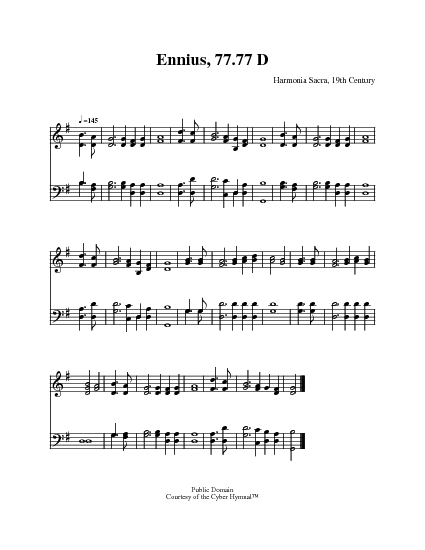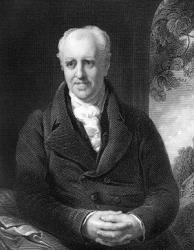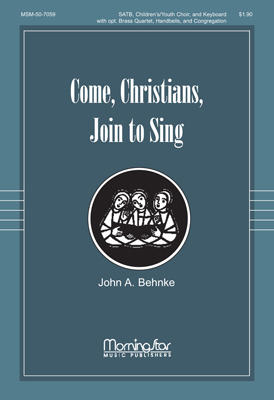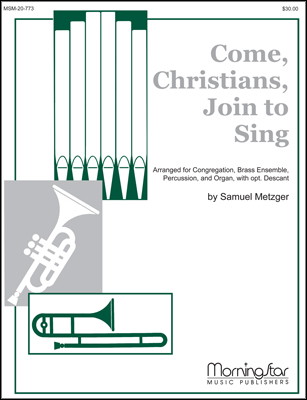- |
User Links
The Christian Pilgrim

Pilgrim, burdened with thy sin, Come the way to Zion's gate
Author: George CrabbePublished in 122 hymnals
Printable scores: PDF, MusicXMLAudio files: MIDI
Representative Text
1 Pilgrim, burdened with thy sin,
Come the way to Zion's gate;
There, till mercy speaks within,
Knock, and weep, and watch, and wait:
Knock--he knows the sinner's cry;
Weep--he loves the mourner's tears;
Watch, for saving grace is nigh;
Wait, till the heavenly grace appears.
2 Hark, it is the Saviour's voice!
Welcome, pilgrim, to thy rest!
Now within the gate rejoice,
Safe, and owned, and bought, and blest:
Safe from all the lures of vice;
Owned by joys the contrite know;
Bought by love, and life the price;
Blessed the mighty debt to owe.
3 Holy pilgrim! what for thee
In a world like this remains?
From thy guarded breast shall flee
Fear, and shame, and doubts, and pains:
Fear, the hope of heaven shall fly;
Shame, from glory's view retire;
Doubt, in full belief shall die;
Pain, in endless bliss expire.
Source: The Voice of Praise: a collection of hymns for the use of the Methodist Church #838
Author: George Crabbe
 Crabbe, George, LL.B., born at Aldborough, Suffolk, Dec. 24, 1754, and educated for the medical profession, but after practising for a short time, he turned his attention to literature, and subsequently took Holy Orders. He was successively Curate of Aldborough and of Stathern, and Incumbent of Evershot, Mirston and Trowbridge. Died at Trowbridge, Feb. 3, 1832. He received his degree from the Archbishop of Canterbury.
Although well known as a poet, his hymns are very few, and but little known. His works include The Village; The Parish Register, 1807; and others. From The Parish Register, his hymn, "Pilgrim, burdened with thy sin" (q.v.) is taken. Crabbe's collected Works were published, with a Memoir, by his son, in 1834.
--John J… Go to person page >
Crabbe, George, LL.B., born at Aldborough, Suffolk, Dec. 24, 1754, and educated for the medical profession, but after practising for a short time, he turned his attention to literature, and subsequently took Holy Orders. He was successively Curate of Aldborough and of Stathern, and Incumbent of Evershot, Mirston and Trowbridge. Died at Trowbridge, Feb. 3, 1832. He received his degree from the Archbishop of Canterbury.
Although well known as a poet, his hymns are very few, and but little known. His works include The Village; The Parish Register, 1807; and others. From The Parish Register, his hymn, "Pilgrim, burdened with thy sin" (q.v.) is taken. Crabbe's collected Works were published, with a Memoir, by his son, in 1834.
--John J… Go to person page >Text Information
| First Line: | Pilgrim, burdened with thy sin, Come the way to Zion's gate |
| Title: | The Christian Pilgrim |
| Author: | George Crabbe |
| Meter: | 7s. |
| Language: | English |
| Copyright: | Public Domain |
Notes
Pilgrim, burdened with thy sin. G. Crabbe. [The Christian Pilgrim.] In the preface to the 1807 edition of his work, The Village, Crabbe says concerning Sir Eustace Grey:—
"In the story of Sir Eustace Grey an attempt is made to describe the wanderings of a mind first irritated by the consequences of error and misfortune, and after¬wards soothed by a species of enthusiastic conversion, still keeping him insane; a task very difficult; and, if the presumption of the attempt may find pardon, it will not be refused to the failure of the poet."
The scene of this story is a madhouse, and the persons are a visitor, the physician, and the patient. Sir Eustace, the patient, gives his history in detail. He was the lord of the manor, had a wife, two children, and a friend; the wife is seduced by the friend; a duel in which the friend is killed; wife pines away; both children die; is himself distracted; plagued by two friends; found peace at last in the Sun of Mercy; and gives a specimen of the preaching through which he was saved. This specimen is:—
"Pilgrim! burdened with thy sin,
Come the way to Zion's pate;
There, till mercy speaks within,
Knock, and weep, and watch, and wait:
Knock—He knows the sinner's cry;
Weep—He loves the mourner's tears;
Watch—for saving grace is nigh;
Wait—till heavenly light appears."Hark! it is the Bridegroom's voice,
‘Welcome, pilgrim! to thy rest.'
Now within the gate rejoice,
Safe, and sealed, and bought, and blest:
Safe—from all the lures of vice;
Sealed—by signs the chosen know;
Bought—by love and life the price;
Blest—the mighty debt to owe.“Holy pilgrim! what for thee,
In a world like this remains?
From thy guarded breast shall flee
Fear and shame, and doubt, and pain:
Fear—the hope of heaven shall fly;
Shame—from glory's view retire;
Doubt—in certain rapture die;
Pain—in endless bliss expire."
These stanzas, when detached from their melancholy surroundings, form a somewhat spirited hymn, and as such they are in use in Great Britain and America.
--John Julian, Dictionary of Hymnology (1907)
Tune
BLUMENTHALFrom Blumenthal's piano piece "Les Deux Anges," Opus 8, adapted as a hymn tune by Frederic W. Root.
PLEYEL'S HYMN
[Pilgrim, burdened with thy sin] (Ogden)


 My Starred Hymns
My Starred Hymns





